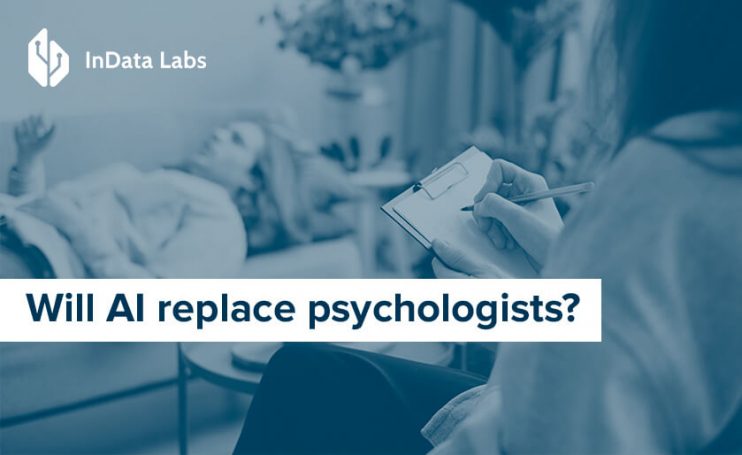Artificial intelligence (AI) is helping shape many industries and may even influence the future of psychology. Will AI replace psychologists altogether, though? Or will AI assist psychology professionals and their patients in creating long-term, effective solutions, while leaving room for human psychologists?
These are the questions experts in both fields are considering. Psychology and artificial intelligence go hand in hand, after all. We’ve always built machines to be smarter and faster than us, but does it really mean that AI will one day take psychologists’ jobs?
Wait… could AI really replace psychologists?
Imagine going in for your weekly therapy session and talking to, well, a robot. The robot psychologist would listen to your concerns, provide some helpful advice, and maybe even write you a prescription for medication.
How would that make you feel? Would you feel comfortable with AI taking over as your psychologist? It’s a little hard for most people to even imagine. We’re so used to the idea of talking to a human for our mental health that it’s difficult to imagine how artificial intelligence could help us in the same way.
Because of this, it’s unlikely that AI will fully replace psychologists, at least soon. But that doesn’t mean that this revolutionary technology won’t help shape the future of psychology. In fact, it already is.
Demand for mental health services soared during the COVID-19 pandemic, and that demand will not go away soon. AI and mental health services will need to merge in order to keep up with demand and provide outcomes for patients.
AI technology in psychology—what does it involve?
Healthcare technology solutions come in many forms. Depending on the area of medicine, artificial intelligence can have several different uses.
There are 4 main types of AI, each with a different level of sophistication. They are:

Currently, researchers have been exploring the possibilities in the limited memory (level 2) stage. Humanity has long since mastered level 1 AI technology, but we are still a long way off from self-aware artificial intelligence that could take on the same work as human beings. An AI psychologist would have to be able to relate and empathize with their patients to be effective.
Psychology and artificial intelligence are always developing, however. The field of AI is exploring many exciting technologies, including:
- Machine learning
- Deep learning
- Facial recognition
- Robotics
- Neural networks
- Natural language processing
- Evolutionary computation
Many of these technologies are still in their infancy. We have only just scratched the surface of level 3 technology and it’s far from perfect at this stage. In the field of psychology, experts are still relying on dataset analysis and predictive analytics to assist psychologists with AI.
AI psychology, data, and improvement of patients’ experiences
Combining psychology and artificial intelligence involves the use of large datasets, which can provide answers to psychologists’ biggest questions and streamline their daily responsibilities. Data analytics in healthcare have already proven to be crucial for improving patient outcomes and experience and they have huge potential for helping people with mental illness seeking therapy as well.
Data can be helpful in removing friction from the mental healthcare process. For instance, AI software development can involve creating tools for patients to find a therapist near them. Finding a therapist easily and being able to choose from providers who take their insurance provides a much better experience for patients.
Another example is in diagnostics. Mental healthcare providers already use data to make diagnostic decisions, often turning to flowcharts and other aids to determine what type of mental illness and specific patterns a patient is dealing with. Artificial intelligence and data simply make this process easier and more accurate for providers and patients alike.

Source: Unsplash
Artificial intelligence is key to delivering patient-centered healthcare. Although it might seem counterintuitive, bringing advanced technology in and removing subjectivity from the processes of finding a therapist and getting a diagnosis makes for a more “human” experience for patients. It’s all about knowing what patients want and need from their psychological care, and data is crucial for truly understanding that.
AI psychologist vs. human therapy
Until recently, there’s been no danger of knowing whether you’re talking to a real person. Artificial intelligence hadn’t progressed to where it would be difficult to tell the difference.
However, as AI technology improves, we have to think critically about the difference between what human therapists currently offer and what a machine can provide. There may be a reckoning in the future, as more people prefer the experience of working with a robot therapist for most forms of therapy.

Source: Unsplash
Right now, a human therapist provides the human emotions and feedback most people appreciate in their mental health treatment. They can empathize as a fellow human, while a machine can only draw on the knowledge it has gained from data and learning.
That’s not to say that AI therapy doesn’t have some advantages. Robot therapists never get tired or have a bad day. They don’t have biases shaped by cultural forces and they offer anonymity and convenience to patients.
Psychology and AI-assisted diagnostics
People self-diagnose their mental health concerns all the time, especially now that we have the internet at our fingertips anytime, anywhere. But if we could all diagnose our mental illnesses so effectively, there would be no need for human therapists. We still need trained professionals to diagnose mental health problems.
With that said, diagnostics are still notoriously challenging, even for professionals. Symptoms may overlap and it takes a lot of experience and skill to determine the actual problems a patient is facing.

Source: Unsplash
The good news is that we now have enough data and knowledge of different mental health conditions to use AI in quickly and accurately providing diagnostic help for mental health professionals. By streamlining the diagnosis process, psychologists can handle larger caseloads and provide a better experience for their patients.
Will psychologists be automated?
In a sense, psychologists have already been automated in some ways. They are using advanced technology to remove the emotion from the diagnosis and treatment process, with excellent results.
Emotions can be helpful in providing therapeutic benefits, but they have no place in evaluation. Even interventions can involve filling in the blanks based on best practices. That’s something AI can handle very well.
Many people are now using apps based on AI as a supplement to their mental healthcare. They might use them to help implement the strategies provided by their therapist, but the apps do not require the supervision of a mental health professional to be beneficial.
Empathy and emotional intelligence in psychology
So, where do human emotions come into all of this? Well, it really boils down to how an actual human can make someone feel when they need to talk about their mental health. Talk therapy isn’t really something a robot can do effectively yet.
People appreciate empathy and the lived experiences of others. A trained psychologist not only has in-depth knowledge of the therapeutic process but also can identify with the patient’s experiences.
The thing about human experiences is that they’re difficult to quantify. It’s hard to put your finger on why a computer isn’t as effective at communicating with a human being as another human. We absorb so many small social cues, contextual exceptions, and other complex communication tools as children that it is difficult for artificial intelligence to mimic them all.

Source: Unsplash
And then, there’s the reality of a person sitting across from you, rather than a robot. A person looks like a human and their body language, eyes, and expression all add to our ability to communicate. Until it’s possible to incorporate these into the AI therapy experience, many people will probably prefer working with a human.
There is a reason apps can only take people so far in their mental health journey right now. When someone needs to work one-on-one with a therapist, they need the support and comfort of another person sitting across from them.
Are psychologists ready for AI to assist them?
It’s not surprising that many professionals in the field have some reservations about welcoming AI technology into their work lives. Change is difficult, as we can see from the slow adoption of technologies such as Big Data and face recognition in healthcare. However, others are embracing technology as their workloads increase and they need help in managing their patients’ needs.
Looking to AI as a tool for improving patient outcomes can help ensure that therapists will be on board with incorporating this technology. Artificial intelligence can be an “assistant” of sorts, removing friction within everyday workflows and freeing up psychologists to use their skills for working directly with patients, something that most AI tools can’t do effectively.
Psychologists who don’t look ahead to the future of the psychology field may find themselves in trouble down the road. They need to be ready and willing to use these tools without reluctance or suspicion. Not only will it be necessary for modern workflows, but patients will come to expect the benefits of advanced technology.
Some individuals may not be ready to embrace the AI revolution, but it’s coming. And by working with artificial intelligence instead of against it, AI will be less likely to replace psychologists in the future.
Why still consider working as a psychologist? Does psychology HAVE a future?
With all this talk of psychology and artificial intelligence, does it even make sense to get into the field at this point? Well, yes. There are a couple of reasons that psychology can still offer great career opportunities.
First, psychology jobs pay well and are great for people who love to work with and help others. A psychologist’s job is to understand and provide insights that help people manage their lives more effectively. Even if you use artificial intelligence tools to accomplish those goals, you will be the one putting the pieces together, problem-solving, and ultimately helping that patient.

Source: Unsplash
The future of psychology and AI are closely linked. After all, we are essentially creating our AI systems to mimic our own intelligence. To do that, we need a deep understanding of how humans think and feel.
Can psychologists work in artificial intelligence, in that case? Absolutely! Whether you want to work with patients directly or you’re excited about the possibilities of artificial intelligence as the psychology of the future, there are so many great employment opportunities.
Until (or if) psychiatrists are replaced by AI, we will need human brains to help patients and develop systems that will best serve patients. The future of psychology careers is still bright.
The takeaway
Will AI replace psychologist roles, including psychiatrists, in the future? It’s still debatable at this point, but probably not entirely, at least for a long time.
Clearly, artificial intelligence and similar technologies are already impacting the industry. But we’re definitely a long way off from that hypothetical robot sitting in an office, listening to patients talk about what’s bothering them. Not only does technology have a long way to go, but people are naturally suspicious of change. Many feel very comfortable talking to a human therapist but wouldn’t feel the same about working with a robot. Societal change happens slowly, especially for mental health.
With that said, we’ve seen how quickly AI and technologies like computer vision software have advanced. It’s not unbelievable to think that in another 50 years, we could see a very different future for psychology.
Author Bio
With a Bachelor’s in Psychology along with an MBA, Sarah Daren has a wealth of knowledge within both the mental health and business sectors. Her expertise in scaling and identifying ways tech can improve the lives of others has led Sarah to be a consultant for several startup businesses, most prominently in the wellness industry, wearable technology, and health education.
Let’s develop an AI-based mental health app!
Have an idea for a revolutionary mental health app and need help with its development? Contact our team of AI developers and data scientists to discuss it in more detail.
